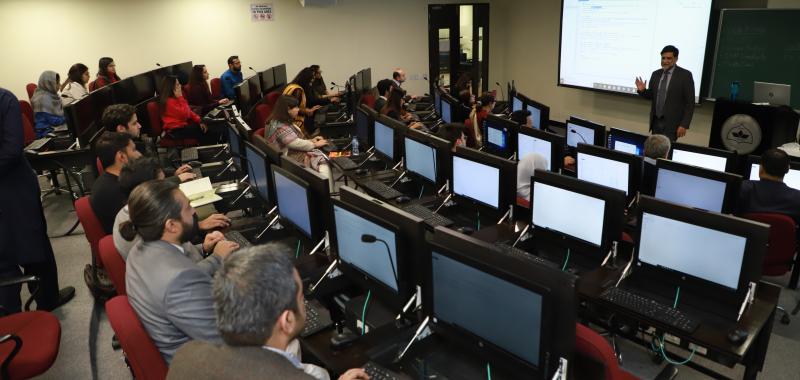
As part of this year’s Alumni Homecoming celebrations, Dr. Tahir Andrabi, Dean Syed Ahsan Ali and Syed Maratib Ali School of Education (SOE) conducted a Masterclass for Alumni on Friday, January 10, 2020 where alumni had the chance to relive the one-of-a-kind LUMS classroom experience.
Titled ‘What Do Pakistani Kids Know?’, the Masterclass was attended by alumni including the winners of the second Vice Chancellor’s Alumni Achievement Awards, SOE staff and faculty, and LUMS Vice Chancellor, Dr. Arshad Ahmad.
Everybody talks about the crisis in the education sector of Pakistan but what do we really know about child learning? In this Masterclass, Dr. Andrabi shared a body of large-scale representative testing of primary age kids in Pakistan that helped shed light on this question. He led the session as a hands-on class where the participants were able to work directly with different data sets on child learning, including a data set of over 5 million test item observations from government elementary schools in Punjab.
As he emphasised the importance of data and evidence when making objective decisions about the education landscape, Dr. Andrabi said, “Decision-making in Pakistan is often tainted with personal experiences. As we get more information, evidence overwhelms prior biases. Incorporating that into decision-making is a question we need to think about.”
Throughout the Masterclass, Dr. Andrabi walked the participants through data sets using the statistical data software ‘STATA’ and highlighted different statistics as evidence for the reasons why education and literacy levels in Pakistani children across villages, towns and cities vary so much.
“The question is not just simply knowing what the kids in Pakistan know. A more interesting question is about the learning distribution in Pakistan. Which kids know more and which kids know less?” continued Dr. Andrabi.
The central discussion of the class revolved around the importance of using the data and evidence we have to tailor education provision to children according to their personal literacy levels. “Each child is different; we have to give personalised education to each student due to a deep variation in households and learning styles,” he shared.
The alumni also actively participated in the discussions and asked insightful questions based on the facts Dr. Andrabi presented. They enjoyed the opportunity to engage with and learn from the Dean, and ended the class with the idea to ponder over evidence when contemplating any decision in the future.








